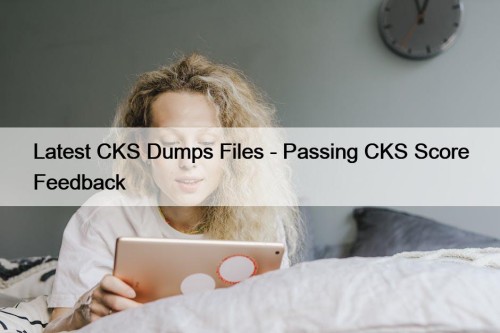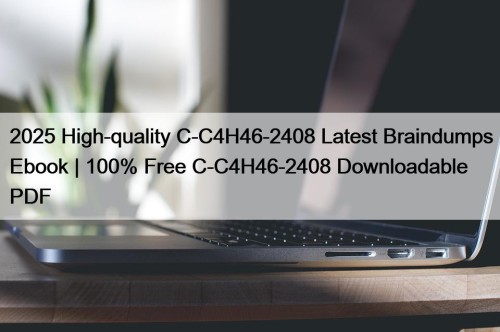Most Popular
 SAP E-S4CPE-2405 Exam Sims - Valid E-S4CPE-2405 Test Guide
SAP E-S4CPE-2405 Exam Sims - Valid E-S4CPE-2405 Test Guide
Everyone has different learning habits, E-S4CPE-2405 exam simulation provide you ...
 Latest CKS Dumps Files - Passing CKS Score Feedback
Latest CKS Dumps Files - Passing CKS Score Feedback
BTW, DOWNLOAD part of RealVCE CKS dumps from Cloud Storage: ...
 2025 High-quality C-C4H46-2408 Latest Braindumps Ebook | 100% Free C-C4H46-2408 Downloadable PDF
2025 High-quality C-C4H46-2408 Latest Braindumps Ebook | 100% Free C-C4H46-2408 Downloadable PDF
Our C-C4H46-2408 study materials target all users and any learners, ...



Latest CKS Dumps Files - Passing CKS Score Feedback

BTW, DOWNLOAD part of RealVCE CKS dumps from Cloud Storage: https://drive.google.com/open?id=1fXbvOd4gozUhgunrLJJq7_5J_JF6yo_6
If you do not receive our CKS exam questions after purchase, please contact our staff and we will deal with your problem immediately. The download process of CKS practice engine does not take you a long time. We have some of the best engineers in the industry, and the system they build will guarantee you a smooth download of our CKS Guide questions. After that, please arrange your own study time. Together with our CKS practice engine, start your own learning journey.
The CKS Exam is conducted online and can be taken from anywhere in the world. It is an open book exam, which means that candidates can refer to documentation and resources during the exam. However, the exam is time-bound, and candidates need to complete the tasks within the allotted time frame.
Linux Foundation CKS (Certified Kubernetes Security Specialist) Certification Exam is a highly sought-after certification for individuals who want to demonstrate their expertise in securing containerized applications using Kubernetes. Kubernetes has become the de facto standard for container orchestration, and as such, it is crucial to have professionals who can secure the platform and the applications running on it.
Linux Foundation Commitment to Your CKS Certified Kubernetes Security Specialist (CKS) Exam Success
For further and better consolidation of your learning on our CKS exam questions, our company offers an interactive test engine-Software test engine. And this version is also popular for the advantage of silulating the real CKS exam. Please pay attention to the point that the Software version of our CKS praparation guide can only apply in the Windows system. When you are practicing with it, you will find that every time you finished the exam, the exam scores will come out.
The CKS certification exam is intended for professionals who have a solid understanding of Kubernetes architecture and security concepts. It is also ideal for those who are responsible for securing Kubernetes clusters in their organizations. CKS exam covers various topics, including Kubernetes installation and configuration, network security, access management, and Kubernetes cluster hardening. CKS Exam is designed to test the candidate’s ability to identify and mitigate security threats in a Kubernetes environment.
Linux Foundation Certified Kubernetes Security Specialist (CKS) Sample Questions (Q32-Q37):
NEW QUESTION # 32
Create a Pod name Nginx-pod inside the namespace testing, Create a service for the Nginx-pod named nginx-svc, using the ingress of your choice, run the ingress on tls, secure port.
Answer:
Explanation:
$ kubectl get ing -n <namespace-of-ingress-resource>
NAME HOSTS ADDRESS PORTS AGE
cafe-ingress cafe.com 10.0.2.15 80 25s
$ kubectl describe ing <ingress-resource-name> -n <namespace-of-ingress-resource> Name: cafe-ingress Namespace: default Address: 10.0.2.15 Default backend: default-http-backend:80 (172.17.0.5:8080) Rules:
Host Path Backends
---- ---- --------
cafe.com
/tea tea-svc:80 (<none>)
/coffee coffee-svc:80 (<none>)
Annotations:
kubectl.kubernetes.io/last-applied-configuration: {"apiVersion":"networking.k8s.io/v1","kind":"Ingress","metadata":{"annotations":{},"name":"cafe-ingress","namespace":"default","selfLink":"/apis/networking/v1/namespaces/default/ingresses/cafe-ingress"},"spec":{"rules":[{"host":"cafe.com","http":{"paths":[{"backend":{"serviceName":"tea-svc","servicePort":80},"path":"/tea"},{"backend":{"serviceName":"coffee-svc","servicePort":80},"path":"/coffee"}]}}]},"status":{"loadBalancer":{"ingress":[{"ip":"169.48.142.110"}]}}} Events:
Type Reason Age From Message
---- ------ ---- ---- -------
Normal CREATE 1m ingress-nginx-controller Ingress default/cafe-ingress
Normal UPDATE 58s ingress-nginx-controller Ingress default/cafe-ingress
$ kubectl get pods -n <namespace-of-ingress-controller>
NAME READY STATUS RESTARTS AGE
ingress-nginx-controller-67956bf89d-fv58j 1/1 Running 0 1m
$ kubectl logs -n <namespace> ingress-nginx-controller-67956bf89d-fv58j
------------------------------------------------------------------------------- NGINX Ingress controller Release: 0.14.0 Build: git-734361d Repository: https://github.com/kubernetes/ingress-nginx
-------------------------------------------------------------------------------
....
NEW QUESTION # 33
SIMULATION
Create a User named john, create the CSR Request, fetch the certificate of the user after approving it.
Create a Role name john-role to list secrets, pods in namespace john
Finally, Create a RoleBinding named john-role-binding to attach the newly created role john-role to the user john in the namespace john. To Verify: Use the kubectl auth CLI command to verify the permissions.
Answer:
Explanation:
se kubectl to create a CSR and approve it.
Get the list of CSRs:
kubectl get csr
Approve the CSR:
kubectl certificate approve myuser
Get the certificate
Retrieve the certificate from the CSR:
kubectl get csr/myuser -o yaml
here are the role and role-binding to give john permission to create NEW_CRD resource:
kubectl apply -f roleBindingJohn.yaml --as=john
rolebinding.rbac.authorization.k8s.io/john_external-rosource-rb created kind: RoleBinding apiVersion: rbac.authorization.k8s.io/v1 metadata:
name: john_crd
namespace: development-john
subjects:
- kind: User
name: john
apiGroup: rbac.authorization.k8s.io
roleRef:
kind: ClusterRole
name: crd-creation
kind: ClusterRole
apiVersion: rbac.authorization.k8s.io/v1
metadata:
name: crd-creation
rules:
- apiGroups: ["kubernetes-client.io/v1"]
resources: ["NEW_CRD"]
verbs: ["create, list, get"]
NEW QUESTION # 34
Create a RuntimeClass named gvisor-rc using the prepared runtime handler named runsc.
Create a Pods of image Nginx in the Namespace server to run on the gVisor runtime class
Answer:
Explanation:
Install the Runtime Class for gVisor
{ # Step 1: Install a RuntimeClass
cat <<EOF | kubectl apply -f -
apiVersion: node.k8s.io/v1beta1
kind: RuntimeClass
metadata:
name: gvisor
handler: runsc
EOF
}
Create a Pod with the gVisor Runtime Class
{ # Step 2: Create a pod
cat <<EOF | kubectl apply -f -
apiVersion: v1
kind: Pod
metadata:
name: nginx-gvisor
spec:
runtimeClassName: gvisor
containers:
- name: nginx
image: nginx
EOF
}
Verify that the Pod is running
{ # Step 3: Get the pod
kubectl get pod nginx-gvisor -o wide
}
NEW QUESTION # 35
Cluster: dev
Master node: master1 Worker node: worker1
You can switch the cluster/configuration context using the following command: [desk@cli] $ kubectl config use-context dev Task: Retrieve the content of the existing secret named adam in the safe namespace.
Store the username field in a file names /home/cert-masters/username.txt, and the password field in a file named /home/cert-masters/password.txt.
1. You must create both files; they don't exist yet. 2. Do not use/modify the created files in the following steps, create new temporary files if needed.
Create a new secret names newsecret in the safe namespace, with the following content: Username: dbadmin Password: moresecurepas Finally, create a new Pod that has access to the secret newsecret via a volume:
Namespace: safe
Pod name: mysecret-pod
Container name: db-container
Image: redis
Volume name: secret-vol
Mount path: /etc/mysecret
Answer:
Explanation:



NEW QUESTION # 36
SIMULATION
Enable audit logs in the cluster, To Do so, enable the log backend, and ensure that
1. logs are stored at /var/log/kubernetes/kubernetes-logs.txt.
2. Log files are retained for 5 days.
3. at maximum, a number of 10 old audit logs files are retained.
Edit and extend the basic policy to log:
1. Cronjobs changes at RequestResponse
2. Log the request body of deployments changes in the namespace kube-system.
3. Log all other resources in core and extensions at the Request level.
4. Don't log watch requests by the "system:kube-proxy" on endpoints or
- A. Send us the Feedback on it.
Answer: A
NEW QUESTION # 37
......
Passing CKS Score Feedback: https://www.realvce.com/CKS_free-dumps.html
- Linux Foundation CKS Practice Exams For Self-Assessment (Web-Based And Desktop) 🧒 Immediately open ✔ www.pass4leader.com ️✔️ and search for 【 CKS 】 to obtain a free download 👷CKS Latest Learning Materials
- CKS Pdf Demo Download 😤 CKS Pdf Demo Download 💒 CKS Frenquent Update 🤴 Search for ✔ CKS ️✔️ on 【 www.pdfvce.com 】 immediately to obtain a free download 💐CKS Latest Exam Dumps
- 100% Pass Quiz 2025 Linux Foundation CKS – Reliable Latest Dumps Files 🦉 《 www.pass4leader.com 》 is best website to obtain 《 CKS 》 for free download 🍡CKS Exam Overviews
- High-quality Linux Foundation - Latest CKS Dumps Files 🏛 Open ➠ www.pdfvce.com 🠰 and search for “ CKS ” to download exam materials for free 🔷Sample CKS Questions Pdf
- Linux Foundation - CKS - Certified Kubernetes Security Specialist (CKS) –Updated Latest Dumps Files 🗽 Copy URL { www.pass4leader.com } open and search for 《 CKS 》 to download for free 🕸Dumps CKS Collection
- Start Exam Preparation with Real and Valid Pdfvce Linux Foundation CKS Exam Questions 🐆 The page for free download of 「 CKS 」 on ➡ www.pdfvce.com ️⬅️ will open immediately 🎢Book CKS Free
- Linux Foundation - CKS - Certified Kubernetes Security Specialist (CKS) –Updated Latest Dumps Files 🏡 Copy URL “ www.torrentvalid.com ” open and search for 《 CKS 》 to download for free ❗Reliable CKS Test Answers
- Reliable CKS Test Answers 🕑 CKS Latest Exam Dumps 💔 Valid CKS Real Test 🏑 [ www.pdfvce.com ] is best website to obtain ➡ CKS ️⬅️ for free download 📳CKS Frequent Updates
- CKS Reliable Test Vce 🌯 CKS Latest Exam Dumps 👆 CKS Frenquent Update 🏓 Immediately open “ www.passcollection.com ” and search for ▷ CKS ◁ to obtain a free download 🐊CKS Latest Exam Dumps
- CKS Reliable Test Vce 😙 Valid CKS Real Test ⛺ CKS Guaranteed Passing 👕 《 www.pdfvce.com 》 is best website to obtain 【 CKS 】 for free download 🥥Reliable CKS Test Answers
- CKS Pdf Demo Download 🖋 Exam CKS Materials 😋 Valid CKS Real Test 📄 Open website ➽ www.pass4leader.com 🢪 and search for ▶ CKS ◀ for free download 😚CKS Frequent Updates
- CKS Exam Questions
- ncertclass.com courses-home.com focused-eg.com ecomstyle.us skillsbasedhub.co.za ignouclasses.in learning.mizanadlani.my.id learn24.fun mgmpkimiakukar.com skilllaunch.co
What's more, part of that RealVCE CKS dumps now are free: https://drive.google.com/open?id=1fXbvOd4gozUhgunrLJJq7_5J_JF6yo_6
Tags: Latest CKS Dumps Files, Passing CKS Score Feedback, CKS Reliable Test Blueprint, CKS Exam Overview, CKS Exam Assessment